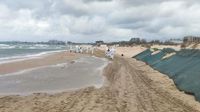Anapa is currently grappling with a significant environmental crisis as palm oil contamination has surfaced on its beaches, compounding the already existing pollution from fuel oil. On April 5, 2025, residents near Blagoveshchenskaya station noticed unusual white clumps washing ashore, leading to a swift investigation by environmental authorities.
The contamination stretches across a ten-kilometer zone, reaching as far as the village of Volna in the Temryuk region. Volunteers, who had been tirelessly collecting fuel oil since the sinking of two tankers in December 2024, were the first to spot the palm oil. After gathering samples, they submitted them for analysis in Krasnodar, confirming the substance as palm oil.
According to ecologist Veniamin Golubitchenko, the situation poses a serious threat to the local ecosystem. "Collecting and disposing of the oil will be difficult because it melts in the sun, causing negative consequences," he explained. As the temperature rises, the palm oil could form a slick that would impede gas exchange between the atmosphere and the sea, endangering marine life.
The exact cause of the palm oil discharge remains a mystery. Several theories have emerged, including a leak from a ship, illegal dumping, or an accident during the transshipment of food and vegetable oils at the port of Taman. Ecologist Tatyana Tribrat suggested that an incident at Taman, where food oils are handled, could be to blame, while others like Roman Pukalov speculated that the oil might have leaked during tank cleaning operations in neutral waters.
Adding to the public's frustration, local residents have voiced their concerns over the authorities' apparent indifference. Comments on social media reflect a growing anger towards what many perceive as negligence, with some comparing the ongoing situation to the earlier fuel oil spills that have plagued the region.
"Oligarchic capitalism cares little for the environment. The focus is on profit, while we suffer the consequences," lamented a local resident. Another commented, "Anapa's beaches are ruined. This once beautiful resort is no more." Such sentiments echo the widespread discontent regarding the environmental management in the area.
Meanwhile, environmental authorities, including the Azov-Black Sea Interdistrict Environmental Prosecutor's Office, have initiated an investigation into the matter. They are working to determine the source of the contamination and ensure accountability.
As for the palm oil itself, experts have differing opinions on its potential impact. While it is considered to have a low hazard class and is not highly toxic, its presence in the marine environment can still disrupt local ecosystems. Ecologist Vladislav Zhukov noted that palm oil, similar to fuel oil, can spread across the water surface, hindering oxygen penetration and affecting marine creatures' ability to breathe.
Ecologists also emphasize the importance of swift action to remove the palm oil before it melts and exacerbates the situation. "If it warms up, the oil could create a film that suffocates marine life," Golubitchenko warned. Currently, the palm oil clumps are not significantly impacting living organisms, but as temperatures rise, the risk increases.
Tourists visiting Anapa are also at risk of encountering the contamination. The oily substance can leave an unpleasant film on their skin after swimming, detracting from the coastal experience. Residents and environmental advocates are urging for immediate cleanup efforts to mitigate the situation before the summer tourism season begins.
In the midst of this crisis, the EFKO group, which operates the terminal for transshipping food cargo in Taman, has denied any involvement in the contamination. They insist that the port operates normally and does not discharge raw materials into the water. Yet, with approximately 60% of Russia's palm oil imports passing through Taman, scrutiny of their operations is intensifying.
As the investigation continues, the local community remains hopeful for a resolution. Volunteers have mobilized to clean the beaches, demonstrating a strong commitment to preserving their environment. However, the long-term implications of this incident remain uncertain, especially considering the ongoing pollution from fuel oil that has persisted since late 2024.
In a recent statement, State Duma Deputy Yury Afonin commented on the situation, attributing the environmental degradation to the failures of capitalism. He noted that the import of palm oil to Russia has surged 25 times in recent years and is now a primary ingredient in many food products, often of dubious quality. Afonin called for an end to what he termed "wild capitalism," emphasizing the need for stricter regulations to protect the environment.
As the situation develops, residents and environmentalists alike are calling for accountability and action. The outcome of the investigation will be crucial in determining the future of Anapa's beaches and marine life. With the summer season approaching, the urgency to address these environmental concerns has never been greater.







